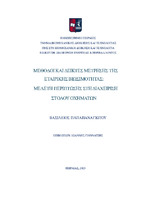Μέθοδοι και δείκτες μέτρησης της εταιρικής βιωσιμότητας : μελέτη περίπτωσης στη διαχείριση στόλου οχημάτων
Corporate sustainability performance & indices - case study in fleet management

View/
Keywords
Βιωσιμότητα ; Διαχείριση στόλου ; Εκπομπές CO2 ; Triple bottom line ; Συνολικό κόστος ιδιοκτησίαςAbstract
This postgraduate thesis explores how companies can both measure and improve corporate sustainability by combining the Triple Bottom Line (TBL) framework with a practical fleet-management calculation model. It first reviews the concepts of Sustainability and Corporate Social Responsibility (CSR), together with the internal and external pressures that push firms toward greener practices. Qualitative and quantitative measurement approaches are then compared, alongside the main social, economic and environmental indicators used in contemporary reporting.
The applied component introduces the “Footprint Calculator,” an Excel-based tool that quantifies direct and indirect CO2 emissions, energy use and total cost of ownership (TCO) for 139 vehicles operated by a multinational fast-moving consumer-goods (FMCG) group in Greece. Model accuracy enables scenario testing: replacing 32 high- mileage internal-combustion vehicles (> 20 000 km yr−1) with battery-electric cars cuts annual emissions by approximately 38 t CO2 (-46 %) and fuel expenditure by roughly €50 000, while achieving a 5–6 year payback despite higher leasing costs.
Further research avenues are proposed, including full Scope-3 life-cycle accounting, the introduction of advanced indicators (energy intensity, biodiversity impact, driver satisfaction) and live telematics integration, with the aim of transforming the tool into a comprehensive CSR decision-support platform.


